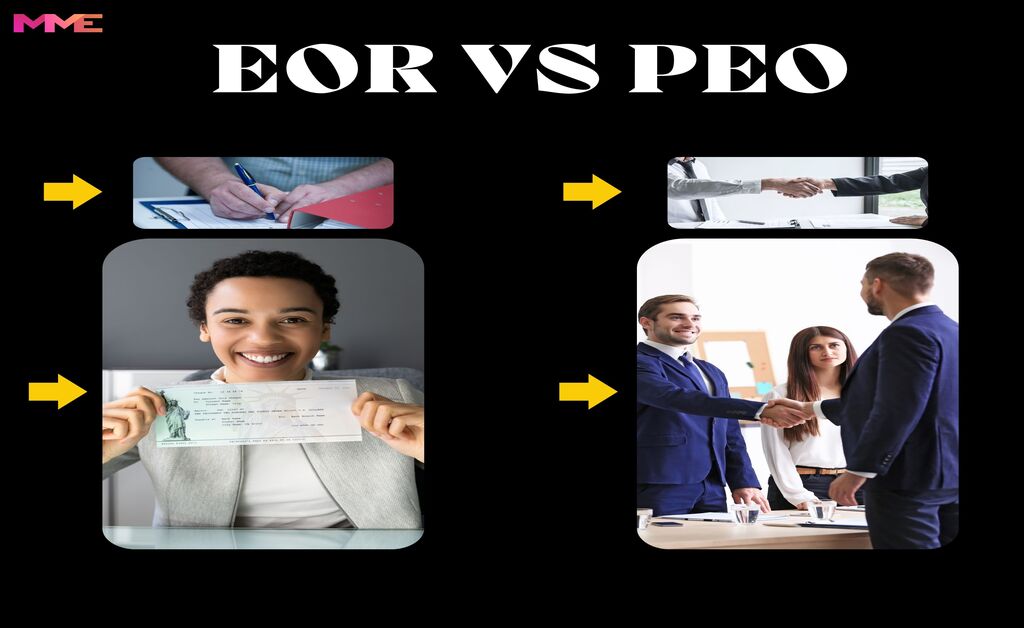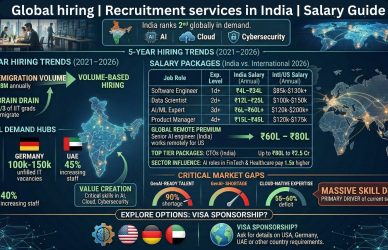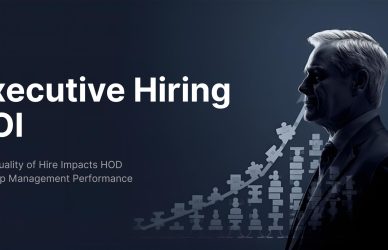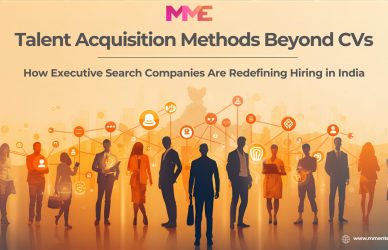Introduction
Understanding the significant differences between EOR vs PEO is essential for making well-informed decisions in today’s dynamic business environment when agility and efficiency are vital. EOR (Employer of Record) and PEO (Professional Employer Organization) differ in how they manage your staff, and both are critical for compliance, legal obligations, cost-efficiency, and administrative efficiency when operating overseas.
Our comprehensive analysis will reveal even the most subtle points about HR outsourcing options, whether start-ups are looking to scale quickly or established organizations are going for streamlined HR solutions. This analysis will guide businesses toward making wise decisions in the EOR V PEO landscape. So, come along as we explore and demystify the world of HR outsourcing, giving you the knowledge and skills you need to confidently and clearly navigate the EOR vs. PEO scenario.

EOR Vs PEO: What Are PEO Services?
The idea of complete HR solutions and attractive benefits packages may seem like far-off fantasies to a business owner juggling numerous tasks. However, a Professional Employer Organization (PEO) and its range of services can offer a game-changing answer when comparing EOR vs PEO. Businesses can outsource essential HR administrative tasks using a PEO or professional employer organization, such as payroll management, benefits administration, workers’ compensation, and training programs.
Additionally, they lessen the compliance load for business owners by offering critical counsel to ensure compliance with federal and state employment rules. A client service agreement (CSA), which outlines the roles and responsibilities, is developed when a business works with a PEO. The client company preserves its status as the worksite employer, in charge of employee management and non-employee-related operations, even while the PEO aids internal HR teams and executes certain administrative chores.
Through this relationship, businesses are given the tools they need to deal with complicated employment laws, automate payroll processing, improve risk management plans, and have access to a variety of benefit alternatives. PEO services are ultimately a tempting option in the continuing EOR vs PEO discussion because they enable organizations to refocus their efforts and resources on core operations, fostering a company culture and boosting employee engagement.

Why Should You Choose PEO Services?
Beneficial Support:
If you are willing to understand the ultimate comparison of EOR vs PEO, you must know the benefits of PEO. PEOs offer more than HR management to businesses; they include valuable advice, onboarding, and training services, as well as helping companies to understand implications while employing part-time/full-time employees, hence improving performance, payroll, and benefit options.
Employee Benefits:
PEOs are good at providing cost-effective employee benefits by taking advantage of their representation of multiple businesses, allowing them to negotiate lower coverage rates for essential uses like medical, dental, and life insurance. This involves simplifying enrollment, dealing with insurance providers, and complying with legal requirements, and they may establish benefits call centers to handle employee queries.
Worker’s Compensation:
These functions are effectively managed by PEOs, resulting in lower costs such as insurance premiums for worker’s compensation. Many companies ensure full coverage through insurance programs and handle paperwork, audits, and employee inquiries. Such companies have specialists who assist injured employees in returning to work and institute safety measures.
Legal Support:
PEOs help address employment problems, such as payroll management and interpreting paid-off rules. They also offer HR specialists or lawyers to handle complex legal situations and minimize the risks that come with it. They support conformity with state regulatory provisions by guiding important decisions and employment objectives across the states.
Payroll:
PEOs operate automated systems that manage payroll operations such as sick-day accrual, tax withholdings, and documentation. They provide convenient services like direct deposit, digital W-2 forms, and customizable pricing packages that can help businesses achieve specific results.
Recruiting:
PEOs help to develop compelling job descriptions, train hiring managers and executives, and often make salary recommendations to attract the best people. Networking channels and job boards enable them to broaden candidate search reach and reach more qualified individuals.
Company Growth:
Smaller enterprises can divert attention from HR duties and towards their primary missions, increasing productivity and revenue accumulation – this way, such companies have faster development due to quick hiring and onboarding processes.
Retirement Options:
PEOs offer retirement benefits like 401(k) plans, promoting employee savings and potentially reducing turnover rates. Some PEOs allow employees to defer portions of their payroll into their 401(k), with the option for employer matching.
Employee Performance:
PEOs assist in implementing effective performance reviews, aiding in employee evaluations, coaching managers, and providing resources for employee development. They offer training and development programs, online learning systems, and explicit training goals to maximize employee productivity.

Why Should You Not Choose PEO Services?
Employee Training:
Along with the benefits PEO offers, there are several cons too. These are necessary to understand the ultimate comparison of EOR Vs. PEO. While PEO services provide access to HR software for streamlined processes, one of the notable drawbacks is the need for employees to adapt to new software. Learning and transitioning to unfamiliar systems can consume valuable time and resources.
Plan Inflexibility:
This flexibility allows many businesses to choose from various group healthcare insurance plans. Yet, the methods may be limited to what a couple of carriers offer. Customized insurance solutions are not possible for businesses due to this lack of flexibility in the program.
Relinquished Control:
The business proprietors should be willing to let go of some control in areas they could have controlled but chose to partner with a PEO. In such instances, there is an increased possibility of encountering problems or making decisions that may require contacting the third party, thereby resulting to some level. This change in managerial dynamics is likely to affect the company culture adversely, too.
Rising Expenses:
Initially, PEOs may be cost-effective for small businesses, but their expenses increase as a company develops. Most PEOs charge on a percentage of payroll basis, a fixed fee per employee or paycheck, or a flat minimum per pay period. These additional fees may increase as the business grows, affecting the budget.
Lack of Data Access
Businesses relying on PEO services often need more access to employee data and business insights. Such a lack of transparency may preclude HR managers, CFOs, and employees from accessing and utilizing indispensable information. This may lead to a communication gap and the need to contact PEO for the required data, which is a lengthy process.
![]()
EOR Vs PEO: What Are EOR Services?
EOR services are the best way to tap into the potential of a global workforce without the trouble of international employment policies and laws. Multinational corporations that embark on international hiring take up a lot of responsibilities and legal obligations that may become burdensome.
By functioning as the specialized third party that takes care of all complexities associated with the construction and maintenance of the global workforce, EOR services come up with a wide range of services to provide an integrated solution. These include essential activities such as payroll management, tax compliance on various benefits, and other legal and administrative obligations related to the workforce.
Businesses can hire the top people worldwide and maintain strict compliance with different countries’ labor laws and regulations by outsourcing the responsibilities under the EOR. Such global EORs act as experienced HR partners with detailed knowledge of diverse payroll rules and labor laws in various countries, thus making it easy to create and update employment contracts while maintaining employment records concerning salaries in multiple countries and ensuring accurate tax returns.
Companies have absolute control over daily management tasks, enabling them to align jobs, project assignments, performance evaluations, and other critical factors related to employment. In the ongoing debate of EOR vs. PEO, EOR services emerge as the linchpin that empowers companies to expand internationally with confidence, efficiency, and compliance, enabling them to seamlessly tap into a global talent pool.

Why Should You Choose EOR Services?
Entering New Markets
EOR service provides an essential advantage for fast and easy entry into uncharted territories when contemplating an expansion. Working locally, EORs understand the maze of legal and regulatory issues they cut through for clients to reduce the time and costs related to market entry. In the ongoing comparison of EOR vs. PEO, EOR services emerge as a strategic choice for businesses seeking a seamless transition into new markets.
Testing New Markets
A solution for firms still determining the possibility of their product or service succeeding in an unfamiliar market is hiring an EOR in a more risk-acceptable position for market testing. This enables firms to garner market intelligence without obligation and the difficulties of establishing a full-fledged legal entity, promoting agility and flexibility.
Engaging Global Talent
EOR services are indispensable for getting outstanding global talent into an organization. This eliminates the need to set up foreign units or subsidiaries and offers a cost-effective and legal way to employ an organization’s global talent pool.
Temporary or Project-Based Work
It would be too expensive to establish a separate company if the work is intended to last for a short period only. EOR services are an appropriate solution in this scenario as they take up the responsibilities associated with employment during the project’s duration and eliminate the need for long-term commitments, offering pragmatic choices in the ongoing debate of EOR and PEO.
Navigating Legal and Financial Complexity,
Managing Global Payroll, Ensuring Tax Compliance, and Navigating Diverse Employment Law can be daunting. By efficiently handling such complexities, EORs allow your company to remain compliant and reduce risks.
Simplifying Global HR Operations
As you extend your business worldwide, HR operations become more complicated. EOR services handle all these cross-border HR obligations by making them more straightforward, allowing you to focus your HR team on strategic and core business tasks. EOR services provide unique value in the changing face of globalization by propelling companies to enter uncharted territories, engaging diverse talents, and maneuvering the intricate web of legal and financial regulation.

Why Should You Not Choose EOR Services?
It may feel like you have less control.
Hiring an EOR may be perceived as diminishing one’s control in the employee onboarding process. On the other hand, certain EOR companies have their own HR expert who can prepare candidates for any business; nonetheless, some business owners enjoy being hands-on on such occasions. One of the considerations in the ongoing discussion of EOR vs PEO is that an individual might feel uncomfortable with this perception of relinquishing control and may want to keep a more hands-on attitude in the hiring process. PEO.
Atrophy of HR
EOR services can make up many responsibilities from an enterprise’s in-house HR department. This advantage could mitigate the HR team’s administrative burden. Still, it also carries a risk of delegating numerous duties to external parties, hence leading to some shortcomings in the HR department’s growth and skill development. To begin, businesses seeking to utilize EOR services, particularly when hiring internationally, need to redirect their HR resources to focus on the learning and development of the internal HR team.
Changes in Company Culture
Delegating the task of employee recruitment to EORs may create changes in the company culture and its developmental path. To a certain extent, the EOR is legally the employer, but the hiring company perceives its actions and relations with employees. Furthermore, implementing EOR service might disrupt the company’s routine work process and social dynamics.
Business should also imagine their future goals and decide whether outsourcing onboarding procedures is consistent with their vision of culture and growth. Before making any final decisions on using EOR services, the company should consider the potential cultural implications of these services and whether they align with the company’s strategy and values for its PEO decision-making process.

EOR Vs PEO: Which Suits Your Business Model The Best?
Structure
A PEO acts as a co-employer, sharing risks and liabilities with your company. This co-employer relationship means that they help manage risks such as workplace safety and facility security. However, you retain some responsibility for employee-related matters.
In contrast, an EOR is a legal substitute for employee-facing matters, assuming full responsibility and liability for your employees. This arrangement means that the EOR entirely covers your areas of risk.
Growth
PEOs establish long-term relationships with their clients, acting as HR partners. They often favor hiring full-time employees over independent contractors, making them suitable for businesses with a continuous hiring model. EORs are more flexible, making them a better choice for companies that hire seasonal or temporary employees, project-specific workers, or independent contractors. EORs’ deep understanding of labor laws reduces your compliance burden.
Services.
PEOs offer comprehensive services, including payroll, benefits administration, taxation, workers’ comp, and risk management. They often provide access to high-quality insurance plans with lower premiums. EORs also offer these services but typically take on fewer HR tasks. However, EORs excel in obtaining workers’ comp for small businesses in nonclerical industries. They also register your business in new locations, saving you time and effort.
Cost
PEOs charge a flat fee per employee per month or a percentage of your payroll per pay period, ranging from $150 to $200 per month. Some may also have a one-time setup fee. EORs have similar fee structures but generally cost less than PEOs since they comprehensively cover your benefits and insurance plans.
Flexibility
Some PEOs may not accept microbusinesses (companies with fewer than 10 employees) as clients. They often handle standard HR functions. EORs are more flexible and are willing to work with small companies. They excel at overseeing temporary employee or independent contractor arrangements, making them suitable for micro businesses.
Here is the table for the ultimate comparison: EOR vs PEO:
Function
PEO
EOR
Structure
Co-employer
Full legal employer
Growth
Better at supporting long-term company growth
It is better for companies that are growing financially but that plan to maintain a small, permanent workforce
Services
More, but not as in-depth
Fewer but more in-depth
Cost
High upfront and long-term costs
High upfront, lower long-term costs
Flexibility
Highly flexible services
Somewhat flexible services

Best Companies That Offer Both PEO and EOR Services
MME
An industry pioneer known for its top-notch EOR services is MME. They are exceptional at assisting companies in effectively managing a multinational workforce. Compliance, payroll, benefits, and HR administration are areas in which their knowledgeable team excels. The EOR solutions provided by MME are tailored to your unique requirements, allowing you to concentrate on strategic growth while they take care of the administrative and legal hassles.
They take pride in being reliable collaborators who are committed to your achievement. To thoroughly understand the ultimate comparison of EOR vs. PEO, you must contact the professionals at MME! Also, businesses looking for a reliable partner dedicated to their success and global expansion should consider MME.
Rippling
Rippling offers a comprehensive HR, payroll, IT, EOR, and PEO services platform. They simplify payroll processes and ensure that everyone is paid in their local currency for a global workforce. It is possible to manage payroll, benefits, time tracking, and reporting all from a single interface thanks to the platform from Rippling, which delivers enterprise-grade security, scalability, and operational efficiency.
Rippling is an excellent choice for companies looking for a productive approach to managing HR, EOR/PEO services, and payroll. To understand the ultimate comparison of EOR vs PEO more profoundly, you must contact the experts at Rippling!
Globalization Partners
Globalization Partners provides human resources and payroll services powered by AI. With contracts that comply with local laws in more than 180 nations, they serve as an EOR and enable quick hiring around the globe. They oversee compliance, offer employee onboarding, manage benefits, and handle payments in more than 180 different currencies.
Their services cover all legal, tax, and HR obligations, so international expansion is simple. Globalization Partners is the best option for businesses considering quick global growth, emphasizing hassle-free compliance and payroll management.
Deel
Deel is a well-known EOR platform that enables businesses to hire in more than 150 countries without setting up new corporations. They give tools for cost estimation, create compliant contracts, keep track of regulatory changes, and offer round-the-clock client service. Deel is a go-to option for businesses like Reddit, Coinbase, and Dropbox because of its offerings, including worldwide payroll, mobile assistance, and sophisticated connections.
For companies looking for all-inclusive EOR services with reliable support and global capabilities, Deel is advised. To understand the ultimate comparison of EOR vs. PEO in a detailed way, you must contact the experts at Deel!
Velocity Global
Velocity Global offers both PEO and EOR services to make global expansion easier. They claim to be able to cut the time it takes to enter any country in half. Their HR administration handles all aspects of hiring, payroll, compliance, benefits, employee training, and risk management. Through their international immigration services, they also provide support with employee relocation around the world. Businesses looking for a speedy and seamless entry into international markets with strong HR support may consider Velocity Global.
Velocity Global’s rapid entry solutions set the bar for global expansion. Their committed staff expedites global operations, assisting companies in quickly and effectively establishing a presence. A seamless entry into new markets is ensured by their comprehensive HR support, immigration services, and global employee relocation aid.
Oyster HR.
A forward-thinking HR executive may use Oyster, a global employment platform, to find, hire, pay for, manage, develop, and care for a thriving remote workforce. Using Oyster, growing firms may provide crucial international team members with the expertise they need without the usual difficulties and expenses. With reliable, legal payroll, unique local perks, and incentives, Oyster provides employment wherever in the world. The key to our success is maintaining mutual trust.
To gain their trust, Oyster maintains open lines of communication with them, honors its commitments, and provides 24/7 support. Oyster is aware that every ambitious objective has ever been attained with failure. Despite obstacles, their trust in one another remains strong. The company develops, grows, and moves forward.
Papaya Global.
The automated SaaS platform from Papaya Global promises to eliminate barriers to employing foreign workers. They provide complete global workforce management solutions, including employee onboarding and cross-border payments in more than 160 nations, to meet the demands of PEO and EOR. Along with providing complete payroll compliance and security on par with banks, Papaya also offers services to well-known businesses like Microsoft, Toyota, Shopify, and Wix.
For companies looking for automated global workforce management with an emphasis on compliance and security, Papaya Worldwide may be the ideal choice. The platform of Papaya Global is designed to be innovative and agile. With their ongoing service and partnership expansion, they are the go-to choice for businesses looking for effective, safe, and future-proof worldwide labor management.
Atlas HXM.
Atlas HXM provides comprehensive cloud-based HR software for EOR and PEO solutions and HR administration. They offer scalable solutions for various sectors, including payroll management, benefits administration, people management, recruiting, and onboarding. Because of the real-time data and analytics provided by their technology, employee interaction, and business processes are improved.
Organizations of all sizes can select Atlas HXM as a flexible option for HR software and comprehensive services emphasizing scalability. A mobile-friendly UI, AI-driven insights, and an intuitive user experience sets Atlas HXM apart. They are the perfect partner for businesses looking for flexible, cutting-edge HR solutions for workforce management and sustainable global expansion because of their commitment to HR compliance, data security, and assistance for international payroll.
Talent500.
Talent500, an international platform for workforce management, offers assistance with onboarding, payroll, benefits administration, and labor law compliance, among other essential staff management needs. They focus on finding excellent candidates globally as part of their PEO services, and they do this by utilizing an extensive network and cutting-edge technology for speedy and efficient recruitment. They place a significant premium on compliance in addition to protecting intellectual property.
The Talent500 platform suits businesses seeking efficient global labor management, focusing on talent acquisition, compliance, and data protection. Talent500 is dedicated to providing global excellence in workforce management solutions, which includes specialized training, career development, and employee retention methods. These solutions help organizations thrive over the long term in a highly competitive global labor market.

Conclusion
In today’s dynamic and globalized business environment, understanding the nuanced differences between Employer of Record (EOR) and Professional Employer Organization (PEO) services is pivotal for organizations seeking to effectively manage their international workforces, navigate complex compliance requirements, streamline administrative processes, and mitigate legal obligations. As co-employers, PEO services offer collaborative HR solutions, risk-sharing, and comprehensive support, making them a valuable choice for businesses with ongoing hiring needs, especially full-time employees.
On the contrary, EOR services are full legal substitutes for employee-facing matters, taking complete responsibility and liability for employees. They are a flexible option well-suited for enterprises that engage temporary, seasonal, or project-specific workers and wish to offload their compliance and legal obligations. The decision between EOR and PEO services hinges on various factors, including a company’s business model, growth trajectory, specific service requirements, budget considerations, and flexibility needs.
Hence, making an informed choice empowers organizations to seamlessly navigate the EOR vs. PEO landscape, scale their global operations, harness a diverse workforce, ensure compliance with complex international regulations, and channel their resources toward core business operations and growth, staying agile and adaptable in the ever-evolving global business landscape. Whether it’s about tapping into new markets, engaging international talents, managing temporary workforces, or addressing complicated legal and financial compliance, EOR and PEO services, each offer unique advantages, and choosing the right path ultimately hinges on the strategic objectives and operational requirements of the organization in question.




